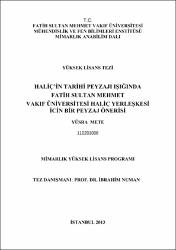Haliç’ in Tarihi Peyzajı Işığında Fatih Sultan Mehmet Vakıf Üniversitesi Haliç Yerleşkesi İçin Bir Peyzaj Önerisi
Künye
METE, Yüsra, Haliç’ in Tarihi Peyzajı Işığında Fatih Sultan Mehmet Vakıf Üniversitesi Haliç Yerleşkesi İçin Bir Peyzaj Önerisi, Fatih Sultan Mehmet Vakıf Üniversitesi Mühendislik ve Fen Bilimleri Enstitüsü Mimarlık Anabilim Dalı, Yayımlanmamış Yüksek Lisans Tezi, İstanbul 2013Özet
Şehir dinamik yapısıyla zaman içinde artan bir hızla değişirken, çoğunlukla tahrip edilmiş tabiatın önemi kendini hissettirmektedir. Bugün gelinen noktada peyzaj tasarımı sadece estetik değerleriyle değil, fizyolojik, psikolojik ve işlevsel etkileriyle birçok ihtiyaca cevap verebilecek özelliklere sahiptir. Diğer taraftan Haliç ve çevresindeki dokunun bozulması sadece binaları ile değil aynı zamanda kent mekânları ve peyzajıyla da olmuştur. Otoyol köprüsü gibi yeni fonksiyonlarla bu durum daha da olumsuz hale gelmiş bulunmaktadır.
Fatih Sultan Mehmet Vakıf Üniversitesi’ne tahsis edilmiş ve işlev değişikliği geçirmekte olan Mühendishâne Mektebi Binaları da bu olumsuzluklarla karşı karşıyadır. Bu çalışmada söz konusu olumsuzluklara peyzaj tasarım ilkelerini kullanarak öneriler üretmek yoluna gidilmek istenmiştir.
Bu çalışmanın giriş bölümünde doğru referans noktalarının belirlenebilmesinde yardımcı olmak üzere problemler tespit edildi, çalışmanın amaç ve kapsamı belirlendi.
İkinci bölümde tarihi verilerin tespitine çalışıldı. Konumuz olan F.S.M.V.Ü. Haliç yerleşkesi peyzaj tasarımı, söz konusu yerin eğitim tarihimizdeki önemi, bulunduğu bölgenin İstanbul için değeri ve binalarının önemli bir kısmının tarihi yapılar olması nedeniyle çalışmada tarihi verilerin daha önemle dikkate alınmasını gerekli kılmıştır. Bu itibarla çalışma sınırlarımızın imkân verdiği ölçüde bölgenin özgün bitki örtüsü, zaman içinde ilave edilen türler, bölgenin tarih içinde ulaştığı ve kaybettiği yapı dokusu ve formların peyzaj özellikleri verilerine ulaşılmaya çalışıldı.
Üçüncü bölümde genelde tasarım ilke ve elemanları hakkında kısaca bilgi verilmeye çalışıldıktan sonra peyzaj tasarımın dayandığı esaslardan bahsedildi.
Dördüncü bölümde peyzaj tasarımı için önemli olan saha verilerine ulaşmak üzere yerleşke analiz ve ihtiyaçları belirlenmeye çalışıldı. Bu kapsamda yerleşkenin bulunduğu sahanın topoğrafik özellikleri, çevre yolları, köprü gibi sahada özellikle partikül, zararlı gaz, gürültü emisyonları ve görünürdeki olumsuz etkileri ile saha içi ve bölge mevcut verileri tespit edilmeye ve peyzaj canlı materyal ve yapı elemanlarıyla çözüm üretilmeye çalışıldı. Beşinci bölümde genel olarak ağaçların yararları, kent ormanları ve kent içi yeşil alanlar, bitkilerin emisyon sorunlarının azaltılmasına yönelik araştırmalar ve son yıllarda üzerinde çalışılan ve genel olarak bitkiler yardımıyla ağır metallerle kontamine olmuş çevre ve toprakların temizlenme yöntemi olan fitoremediasyon tekniklerine yer verildi. Aynı bölümde peyzaj materyali kaynaklarının verimli ve uzun vadeli kullanımına yönelik olarak yine çalışma sınırları içinde sürdürülebilirlik esaslarına değinildi.
Altıncı bölümde tasarım sürecinin ve ihtiyacının başlangıç noktası olarak belirlenmiş problemlerin bahsedilen veriler yardımıyla söz konusu problemlere çözüm getirebilmek üzere peyzaj proje önerisi hazırlanması amacıyla; kullanıcıların saha içi fonksiyonları için belirlenen bilinir peyzaj ihtiyaçlarına ilave olarak, yerleşkenin maruz kaldığı yoğun araç trafiği kaynaklı zararlı gaz, partikül ve gürültü emisyonlarını azaltmak, görüntü kirliliğini perdelemek için ve tasarım önerisi kapsamında sürdürülebilirlik esaslarına uymaya çalışarak üniversite peyzajına şahsiyet kazandıran bir tasarıma öneriler geliştirilmesine çalışıldı. While the city, with its dynamic nature, is changing at at an increasing speed in time. Its destroyed natural settings and landscape often make sit self significantly felt. Today there is a need forlandscape design not only for its aesthetic values , it entails but also for its psychologically, physiologically positive effect sand functional usage. On the otherhand, the phisical destruction in Halic vicinity occures not only in building stock but also in its urban space sand historical landscape. New functions like highway bridge makes the situation even worse.
Then early restorated buldings of the “Muhendishane Mektebi” which are handed over to Fatih Sultan Mehmet University are subjected to the same destuctive effects. In this study ıt is tried to bring alternative suggestions to these effects in the FSMVU Haliç Campus.
In the ıntroductory section of this proposal inorder to develop the proper referance points the problems have been identified in detail and the aims, objective sand the limitatoios of the study have been set.
In the second chapter historical data has been studied. The proposal wase valuated based on the historical structure of the FSMVU Halic campus. The location of the area is important for Istanbul since it is surrounded by historical architectures therefore we must pay more importance on the historical values. Given the time frame for the development of this proposal the natural vegetation of Halic area was examined. Also the vegetation that was later man-made and planted was examined. With time the structural texture has changed and this was also examined along with the lanscape materials that exist in this area.
In the third chapter of the proposal the design principles along with the elements were briefed and landscape design was briefed on how to adapt these principles and elements.
In the fourth chapter the area was analysed based on the elements developing the area and the other elements surrounding the area. The topographical specifications were examined along with the surrounding high ways, bridge sand the negative pollution, environmental effects that these structures give out to the campus and these effects will be examined in further detail and the usage of landscape materials will help us resolve the problems of the negative environmental effects.
In the fifth chapter the benefits of trees was examined and urban forrests, and urban green vegetation. The placement of propoer plants in order to minimize the effects of emission was briefed. During the recent years the concept of phytoremedietion has become popular in research in studies. The usage of vegetations in order to minimize the effect of contemination from heavy metals on soil and water. Given the structure frame of the proposal, the landscape materials and resources used were examined in order to maximize sustainability and life span of the materials used. In the sixth section the identified problems in the previous sections were examined on how to evelop a project to solve them. There quired landscape materials for the people in theUniversity. In order to camaflauge the scene of the pollution caused by the cars, heavy metals and other environmental reasons a proposal was created on how to minimize it, and the proposal on this is based on the sustainability factor.



















